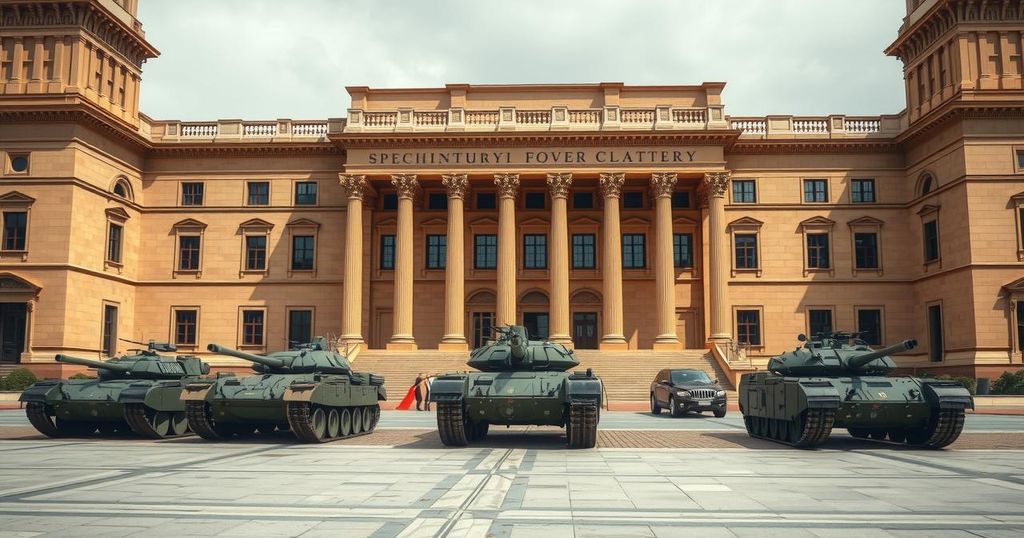Sudan Military Regains Control of Republican Palace Amid Ongoing Conflict

Sudan’s military has announced the retaking of the Republican Palace in Khartoum from rival RSF forces, marking a significant strategic victory in ongoing conflict. Despite this gain, the humanitarian crisis continues to escalate, with rising casualties and displacement. Historical instability in Sudan underlines the complexities of the current situation, raising human rights concerns amid challenges for future peace.
On Friday, Sudan’s military announced it had regained control of the Republican Palace in Khartoum, the former governmental seat, following nearly two years of conflict with rival paramilitary forces. Social media footage depicted soldiers claiming the date as the 21st day of Ramadan, emphasizing their presence within the palace grounds, which appeared to be damaged. Soldiers were seen with assault rifles and rocket-propelled grenade launchers, celebrating their victory with chants of, “God is the greatest!”.
Khaled al-Aiser, Sudan’s Information Minister, confirmed the military’s retaking of the palace and expressed optimism about ongoing military efforts. He stated, “Today the flag is raised, the palace is back, and the journey continues until victory is complete.” This development signifies a crucial strategic victory for the Sudanese military, indicating the gradual expulsion of the Rapid Support Forces (RSF) from Khartoum, although sporadic gunfire was heard in the area, raising questions about ongoing hostilities.
The RSF has yet to officially respond to the loss of the palace. Nevertheless, they continue to hold territories in Sudan, including the strategic city of al-Maliha, where they recently claimed control. The Sudanese military acknowledged ongoing skirmishes in the vicinity but did not confirm the loss.
The ongoing conflict in Sudan has created a severe humanitarian crisis, resulting in over 28,000 deaths and displacing millions. The war has pushed some families into extreme conditions, with desperate measures such as eating grass reported in areas affected by famine. This situation has been compounded by the historical significance of the Republican Palace as a symbol of power in Sudan since British colonization.
The instability in Sudan escalated following the ousting of President Omar al-Bashir in 2019. The transition to democracy was interrupted by a military coup in 2021, leading to a protracted conflict between the Sudanese military and the RSF. Allegations of human rights abuses have been directed at both factions amid ongoing violence, with the RSF facing accusations of engaging in acts of genocide against ethnic groups in conflict zones previously.
As the military continues to gain ground against the RSF, the cycle of conflict appears unbroken, signaling a challenging path forward for Sudan and its people in the pursuit of peace and stability.
The retaking of the Republican Palace by Sudan’s military marks a significant moment in the ongoing conflict with the RSF, reflecting both a strategic and symbolic victory. Despite this development, the humanitarian crisis remains dire, with high casualties and widespread displacement. The historical and political background of Sudan illustrates a complex landscape of power struggles, underscored by grievous allegations of human rights abuses. Moving forward, the situation necessitates international attention and support for efforts towards restoring peace and stability in the region.
Original Source: www.haltonhillstoday.ca







